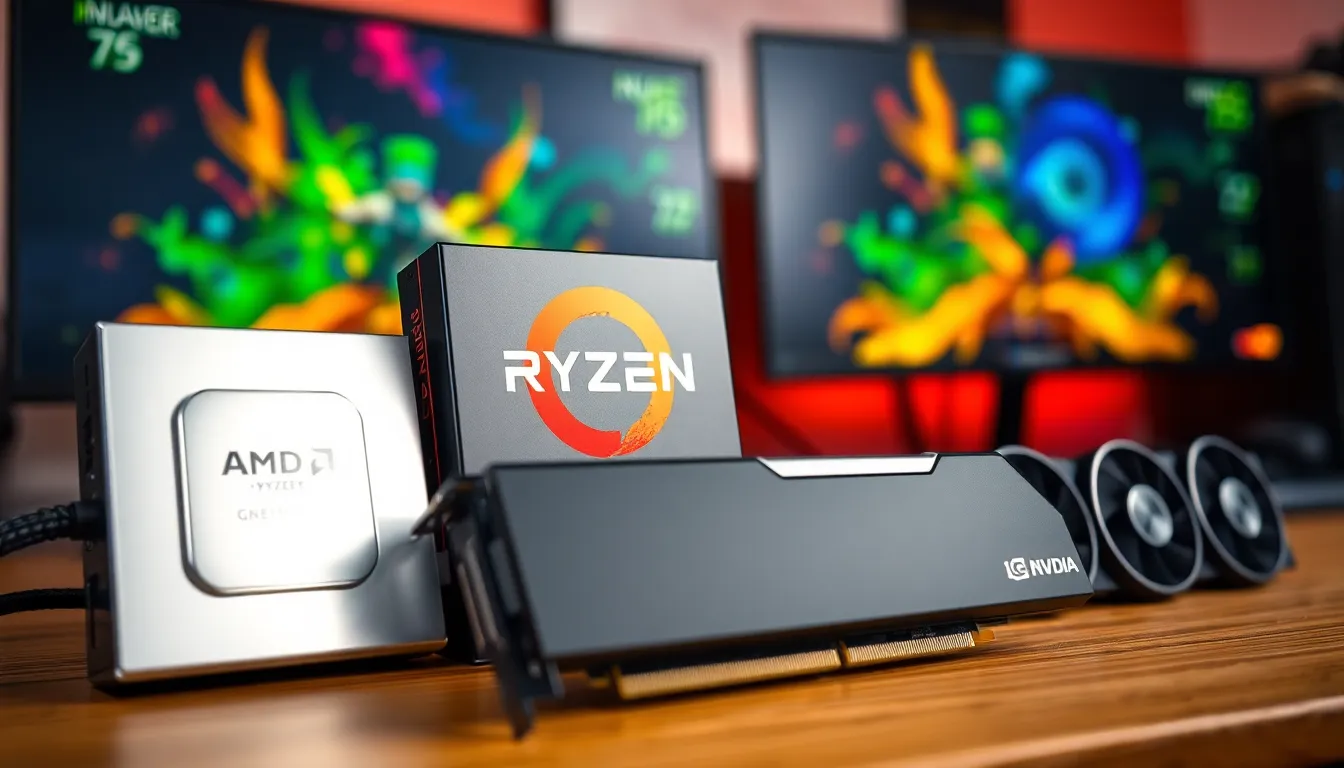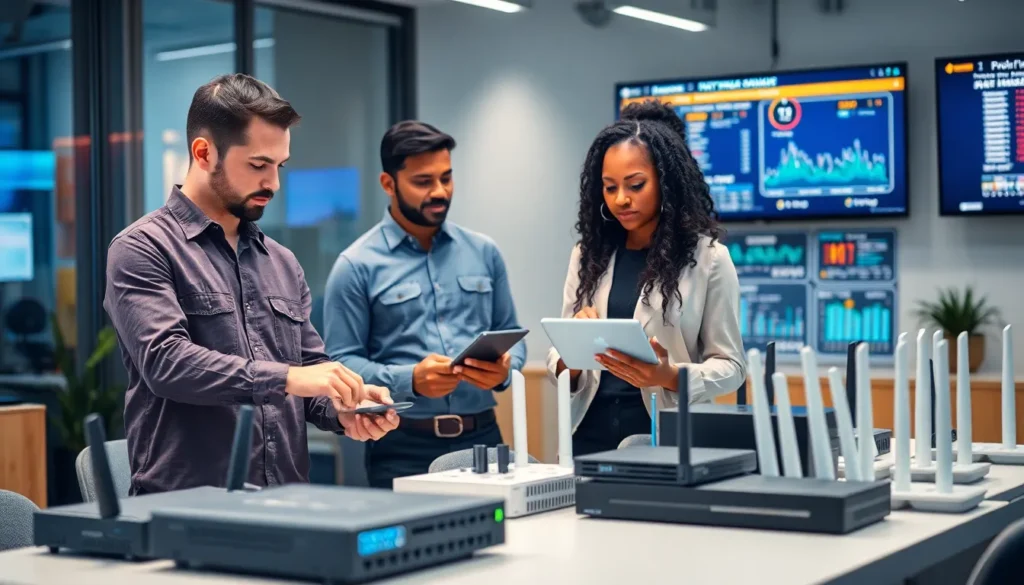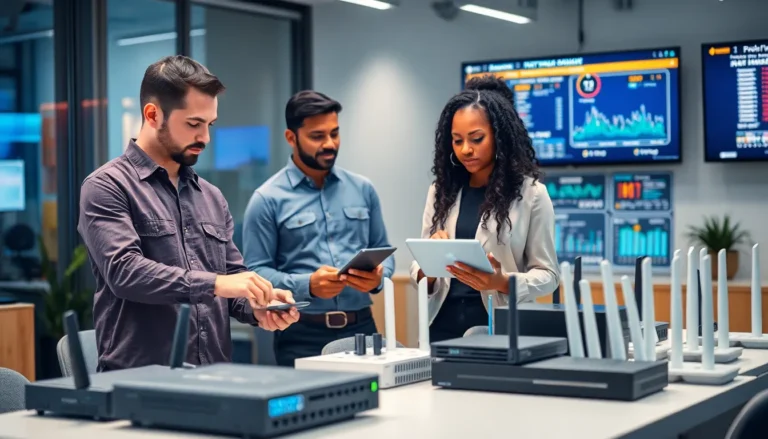Table of Contents
ToggleBuilding a PC can feel like a high-stakes game of Tetris, where every piece matters and one wrong move could leave you with a jumbled mess. But fear not! With the right approach, creating an efficient PC build can be as satisfying as finding the last piece of your favorite puzzle. Whether you’re gaming, streaming, or crunching numbers, the right components can elevate your experience without breaking the bank.
Overview of Efficient PC Builds
Efficient PC builds combine performance and cost-effectiveness. Assembling a PC requires selecting components that work well together. Users benefit from high-performance CPUs, adequate RAM, and responsive storage drives. Each part plays a role in ensuring the system operates smoothly.
Budget-conscious builders often look for the best value in graphics cards and motherboards. Component compatibility matters, so checking specifications helps avoid issues. Building an efficient PC enhances gaming and streaming experiences while managing energy consumption effectively.
Processor choice impacts overall performance significantly. Popular options include AMD Ryzen and Intel Core series. Selecting a CPU with the right number of cores and threads caters to multitasking and high-demand applications.
Memory size and speed also contribute to a PC’s responsiveness. A minimum of 16GB of RAM serves well for gaming and content creation. Higher speeds like 3200MHz or 3600MHz improve performance in specific tasks.
Storage choices encompass SSDs and HDDs, with SSDs offering faster load times. Using NVMe drives optimizes speed further. Prioritizing storage solutions based on usage patterns leads to a more efficient setup.
Power supply units (PSUs) should meet system requirements without excess capacity. A reliable PSU ensures stability and longevity. Building with quality components ultimately results in a system that meets performance goals.
An efficient PC build emphasizes a balance of quality, compatibility, and cost. Understanding the purpose of each component allows for thoughtful decisions. The right approach leads to a rewarding experience in building a PC tailored to specific needs.
Key Components for Efficient Builds

Selecting the right components is crucial for creating an efficient PC build. Focus on performance, compatibility, and cost-effectiveness to meet diverse needs.
Processor Options
Popular processor options include AMD Ryzen and Intel Core. AMD offers multiple cores, making it ideal for multitasking and demanding applications. Intel processors excel in single-threaded performance, benefiting gaming experiences. Consider the specific requirements of the software to choose the best fit. Identifying a balance between price and capability provides excellent value for builders. For tasks like content creation, opting for a higher core count significantly enhances productivity.
Graphics Card Selection
Graphics cards play a critical role in an efficient PC build, especially for gaming and rendering. Evaluate the latest models from NVIDIA and AMD, considering performance metrics like frame rates and VRAM size. Determine the GPU’s compatibility with the motherboard to avoid bottlenecks. Powerful graphics cards deliver better visuals and improved frame rates in demanding games. Prioritizing a suitable balance of cost and performance ensures long-term satisfaction and usability, supporting future gaming or creative needs.
Memory and Storage
Both memory and storage significantly affect overall system performance. It’s advisable to select a minimum of 16GB of RAM for gaming and content creation tasks. Faster RAM speeds lead to enhanced response times and improved multitasking capabilities. Additionally, NVMe SSDs outperform traditional HDDs, offering quicker load times and better system responsiveness. When planning storage, consider a dual-drive setup for the operating system and applications alongside larger HDDs for data. Matching storage solutions with performance needs optimizes efficiency and enhances productivity.
Budget Considerations for Efficient Builds
Budget plays a vital role in constructing efficient PC builds. Exploring the right price range ensures performance meets needs without overspending.
Mid-Range Builds
Mid-range builds typically range from $800 to $1,200. This budget allows for a balanced selection of components. CPUs like the AMD Ryzen 5 or Intel Core i5 provide strong performance for multitasking and gaming. Graphics cards within this range, such as the NVIDIA GeForce GTX 1660 Super, deliver quality visuals without breaking the bank. Additionally, choosing 16GB of RAM enables smooth operation during demanding tasks. Prioritizing a reliable SSD boosts system responsiveness, enhancing the overall user experience. Combining these components creates an efficient mid-range setup that caters to both gamers and content creators.
High-End Builds
High-end builds start around $1,500 and can exceed $2,500. This level permits the use of top-tier components ensuring exceptional performance. Processors like the AMD Ryzen 9 or Intel Core i9 excel in demanding applications and multitasking. Users benefit from high-end graphics cards such as the NVIDIA GeForce RTX 3080, which handle the latest games effortlessly. RAM capacity increases to 32GB or more, supporting intense workloads and speeding up tasks. An NVMe SSD is crucial for fast load times, pairing well with additional HDD storage for data. With these investments, builders achieve an efficient high-end PC that meets various requirements.
Performance Optimization Tips
Performance optimization is crucial for maximizing the efficiency of a PC build. Following these tips helps elevate the overall experience.
Coolers and Power Supply
Effective cooling solutions maintain optimal temperatures for components. Choosing a high-quality CPU cooler, such as air or liquid cooling options, significantly impacts performance. Additionally, sufficient airflow within the case enhances heat dissipation. A reliable power supply unit (PSU) ensures stability and reduces the risk of component failure. Selecting a PSU with a rating of at least 80 Plus Bronze guarantees energy efficiency and waste reduction. Balanced wattage and enough connectors for all components contribute to the longevity of the build.
Cable Management
Proper cable management improves airflow within the case, preventing overheating. Arranging cables neatly minimizes clutter, which enhances aesthetics and accessibility. Utilizing zip ties and Velcro straps can keep cables organized and secure. Effective routing of cables helps avoid obstruction of airflow, promoting better cooling efficiency. Consider shortened cables or custom-length options for a cleaner look. Ultimately, organized cables not only enhance functionality but also showcase the overall craftsmanship of the build.
Building an efficient PC is about more than just picking parts; it’s about creating a harmonious system that meets specific needs. By focusing on compatibility and performance, builders can achieve optimal results without breaking the bank.
Investing in quality components like high-performance CPUs and fast storage drives ensures a smooth user experience, whether for gaming or content creation. Budget-conscious choices in graphics cards and RAM can enhance overall performance while keeping costs manageable.
Ultimately, a well-planned PC build not only boosts productivity but also offers a rewarding journey for enthusiasts. With the right approach and careful consideration, anyone can assemble a powerful machine tailored to their requirements.







